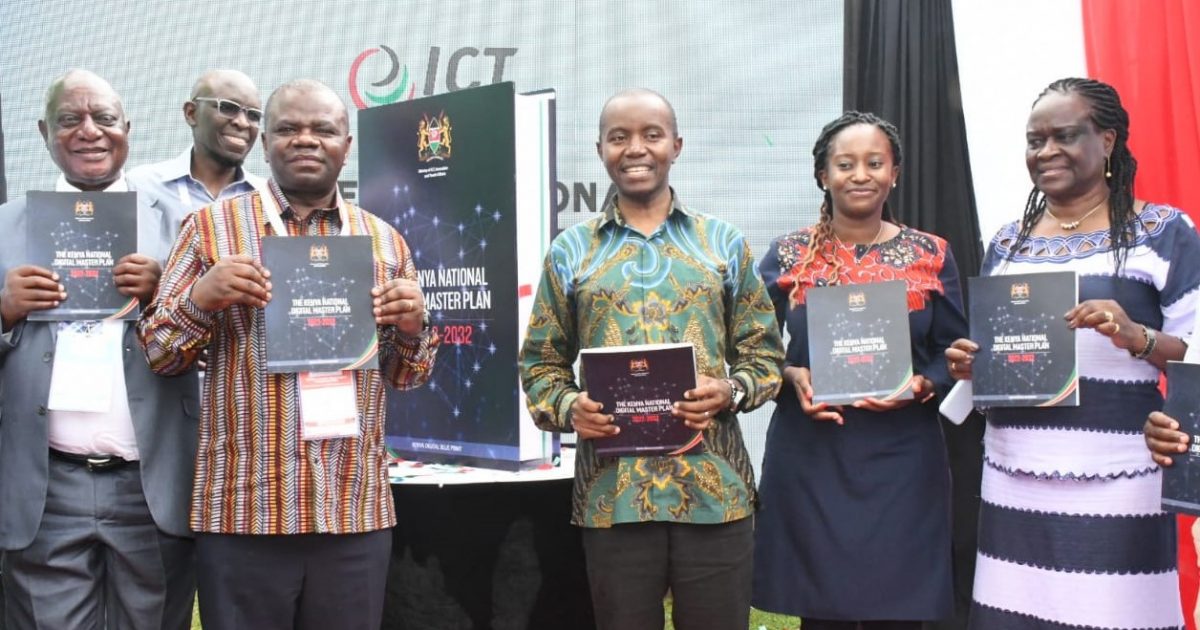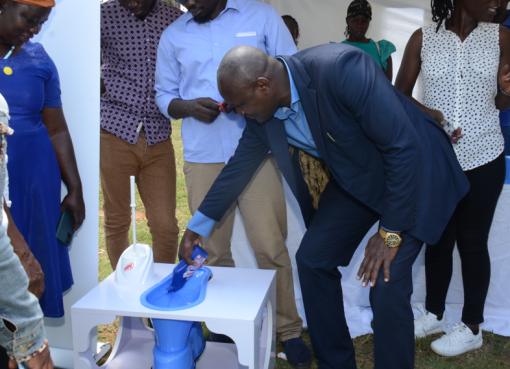Kenya National Digital Master plan 2022-2032 which is a sequential progression of the master plan 2014-2017 has been unveiled to guide the country forward on ICT deployment and investments.
It’s the blueprint for leveraging and deepening the contribution of the ICT sector to accelerate socio-economic growth.
ICT, Innovation and Youth Affairs Cabinet Secretary (CS) Joe Mucheru says the plan is expected to guide stakeholders’ response to gaps such as closing the digital divide, unstructured deployment of ICT across the public service and the need to enforce standards in helping the country tackle its various challenges.

“This master plan has incorporated the use of emerging technologies such as block chain, internet of things, artificial intelligence, big data and quantum computing,” said Mucheru.
The master plan outlines a structured roadmap on the delivery of ICT infrastructure and services as well as the development of ICT skills underscoring that digitization is a major instrument in leapfrogging all social economic development.
The CS said the plan will provide guidance on investment priorities to both local and external investors.
The plan has identified 19 flagship projects which the government will focus on to accelerate digital transformation of the country.
He said the new broad-based master plan comes at a time when the digital economy is also transforming the way people work and the skills they need to carry out their jobs.
Mucheru launched the digital master plan on the sidelines of the annual ‘Connected Kenya summit’ taking place at Leisure Lodge Resort in Kwale County.
The four days ICT forum is running under the theme, ‘Accelerating digital transformation’ and has attracted a galaxy of ICT experts from both public and private sector players.
In attendance are Uganda’s ICT Minister Dr. Chris Baryomunsi, his Tanzanian counterpart Dr. Faustine Ndugulle and Rwanda’s Director General for Digital Transformation Gordon Kalema.
Mucheru was accompanied by the ministry’s Chief Administrative Secretary Maureen Mbaka, Principal Secretaries Jerome Ochieng (ICT) and Esther Koimett (Broadcasting and Telecommunications), ICT Authority Ag. Director General Dr. Kipronoh Ronoh as well as the Government Spokesperson Col. (Rtd.) Cyrus Oguna among other dignitaries.
The CS said the master plan is a product of an all-inclusive, participatory and consultative process, noting that its successful implementation will require concerted effort and commitment from all stakeholders.
Mucheru noted that Kenya’s vision 2030 identifies ICT as one of the core drivers of socio-economic growth and development strategy.
He said the government will pursue digital transformation of the economy for greater accountability and transparency as it seeks to position the country as a ‘regional digital economic hub’.
Mucheru said the ICT connected forum will serve as the platform to gauge the progress made on the digital reforms, explore opportunities for collaboration and integration in the post Covid-19 pandemic recovery phase and scale up public-private partnership and dialogue.
He said the plan will put ICT at the centre of the national economic agenda, improving broadband access, efficient public service delivery and maintaining an open government.
“This master plan will define our efforts in the next ten years to create business opportunities, wealth creation, employment opportunities and the contribution of ICT to the general growth of the economy,” said Mucheru.
The newly unveiled master plan highlights the reduction of the digital divide to spur economic growth of rural areas, proposes the deployment of 100,000 kms of fibre optic infrastructure to 40,000 public schools and other learning institutions, 20,000 government institutions, 13,000 health facilities, 25,000 hotspots to support youth and innovators and establishment of 1,450 wards digital innovation hubs.
“To enable one-stop-shop for all government core services, the plan proposes accelerated automation and digitization for all government core services in both national and county governments,” he said, adding that this process will kick start with the digitization of over 5 billion government records.
To accelerate growth of e-commerce initiatives the master plan proposes implementation of the national physical addressing system and the national spatial data infrastructure to promote the growth of e-commerce and private enterprise.
“The master plan is crucial at a time when the world enters a new round of industrial revolution and countries around the globe are expediting their digital economic expansion hence the need to modernise government services,” he said.
Mucheru said the plan seeks to create job opportunities for the youth and spur local manufacturing and growth of small and medium size enterprises.
“The master plan proposes establishment of two software factories and another two electronic manufacturing factories that will serve Kenya and the region and are estimated to hire over 10,000 software engineers among others,” he said.
The CS said to enable the citizens and the public servants to effectively utilise technology in their businesses and work, the master plan proposes digital literacy capacity building for all citizens starting with 20 million citizens, training of 300,000 public servants and building adequate technical support through training of 10,000 ICT professionals.
“To position the country as a regional ICT hub, the plan proposes establishment of regional ICT smart hubs as well as regional submarine cables maintenance depots,” he noted.
The master plan also seeks to address e-waste challenges by proposing an e-waste management programme which gives strategic focus on e-waste production, handling and disposal.
To promote cloud services and data management for the country, the master plan proposes accelerated implementation of Konza Technopolis and data protection legislations.
To promote local innovators, entrepreneurs and businesses the plan proposes harmonisation of legislations to enable growth of ICT businesses in addition to hosting annual international ICT expo for entrepreneurs to showcase their products and services.
Mucheru said the successful implementation of the master plan will allow the country to live up to its reputation as the Silicon Savannah on matters ICT and economic development.
By Hussein Abdullahi





